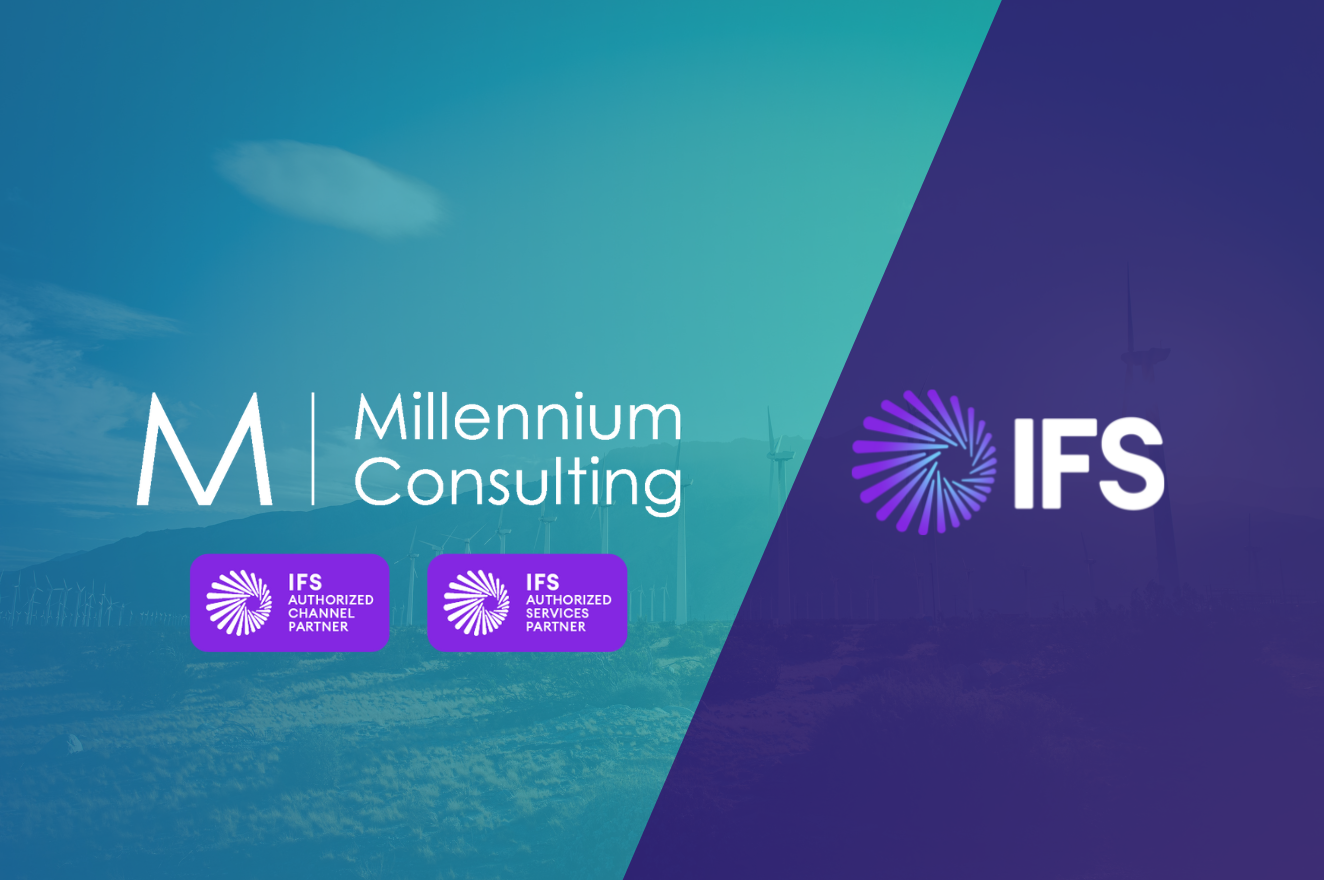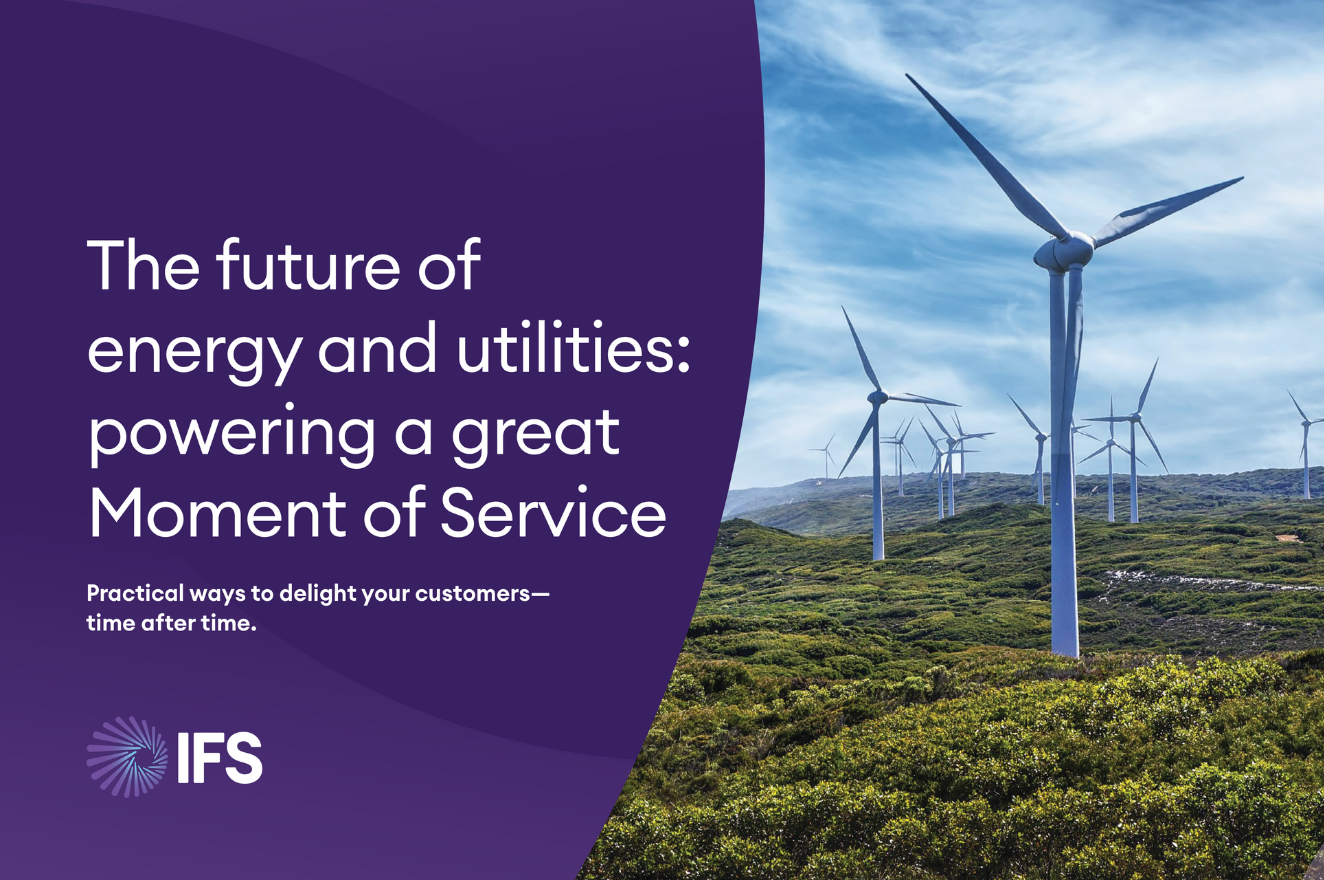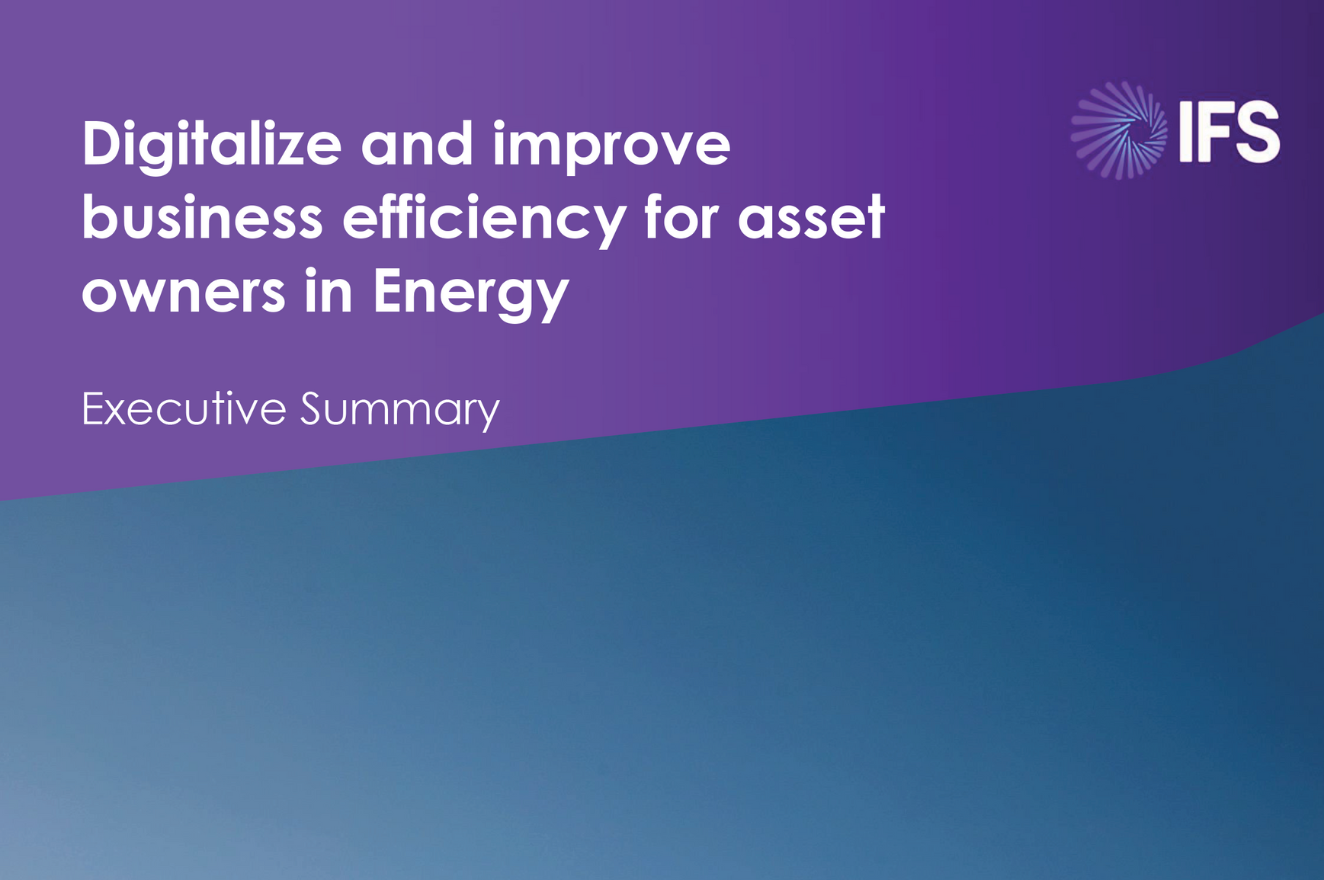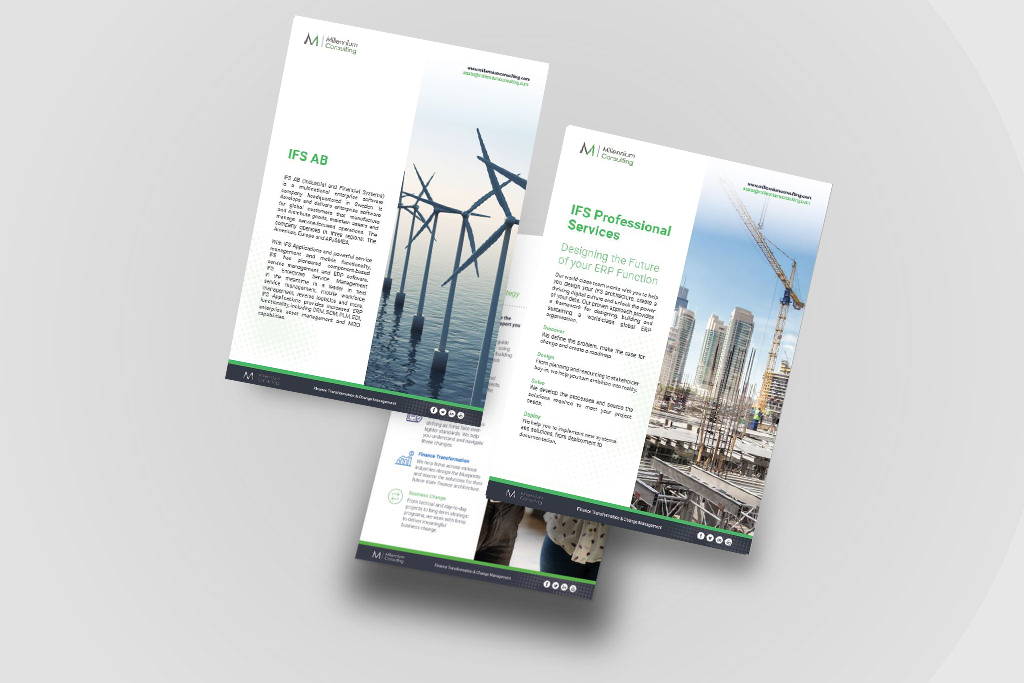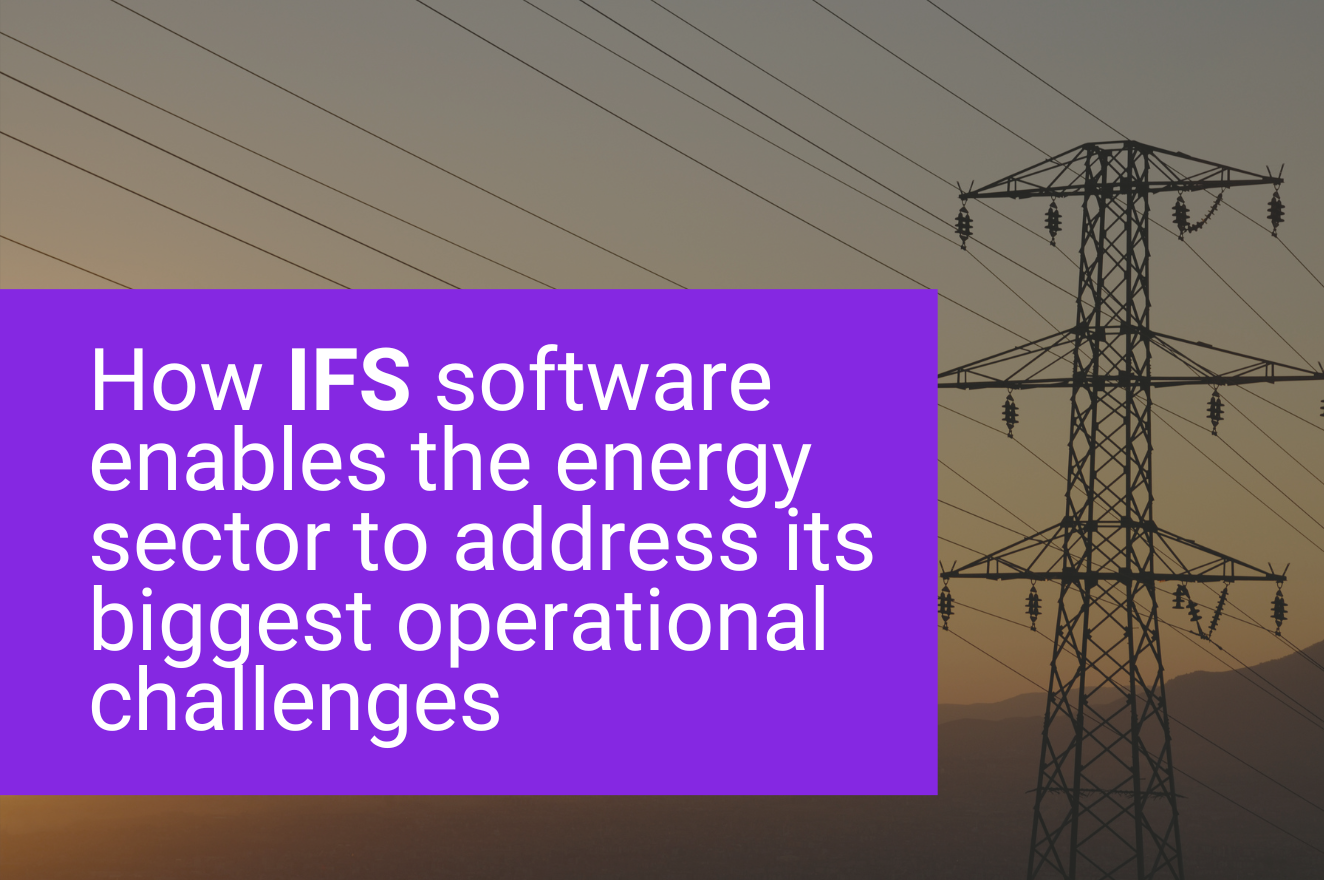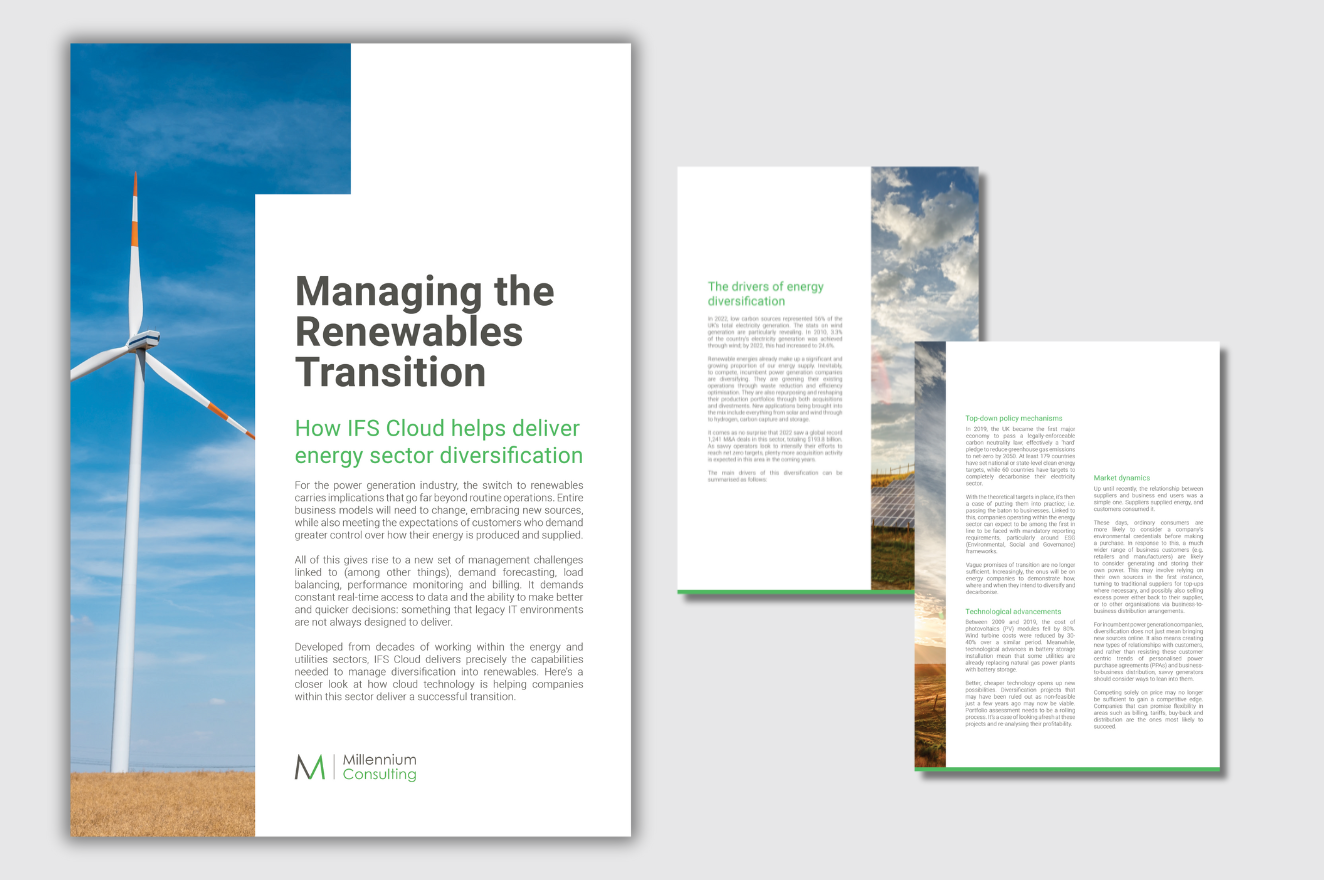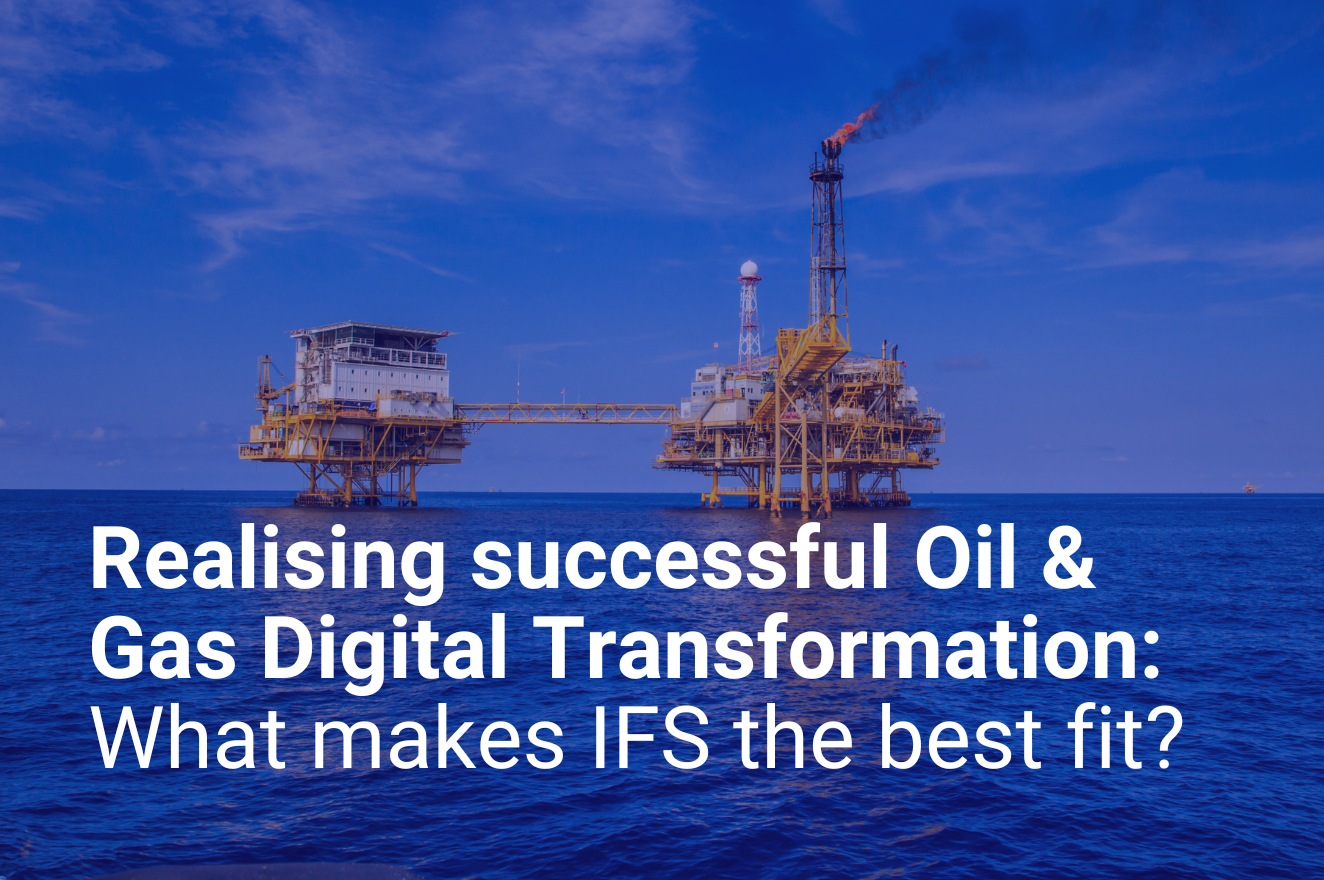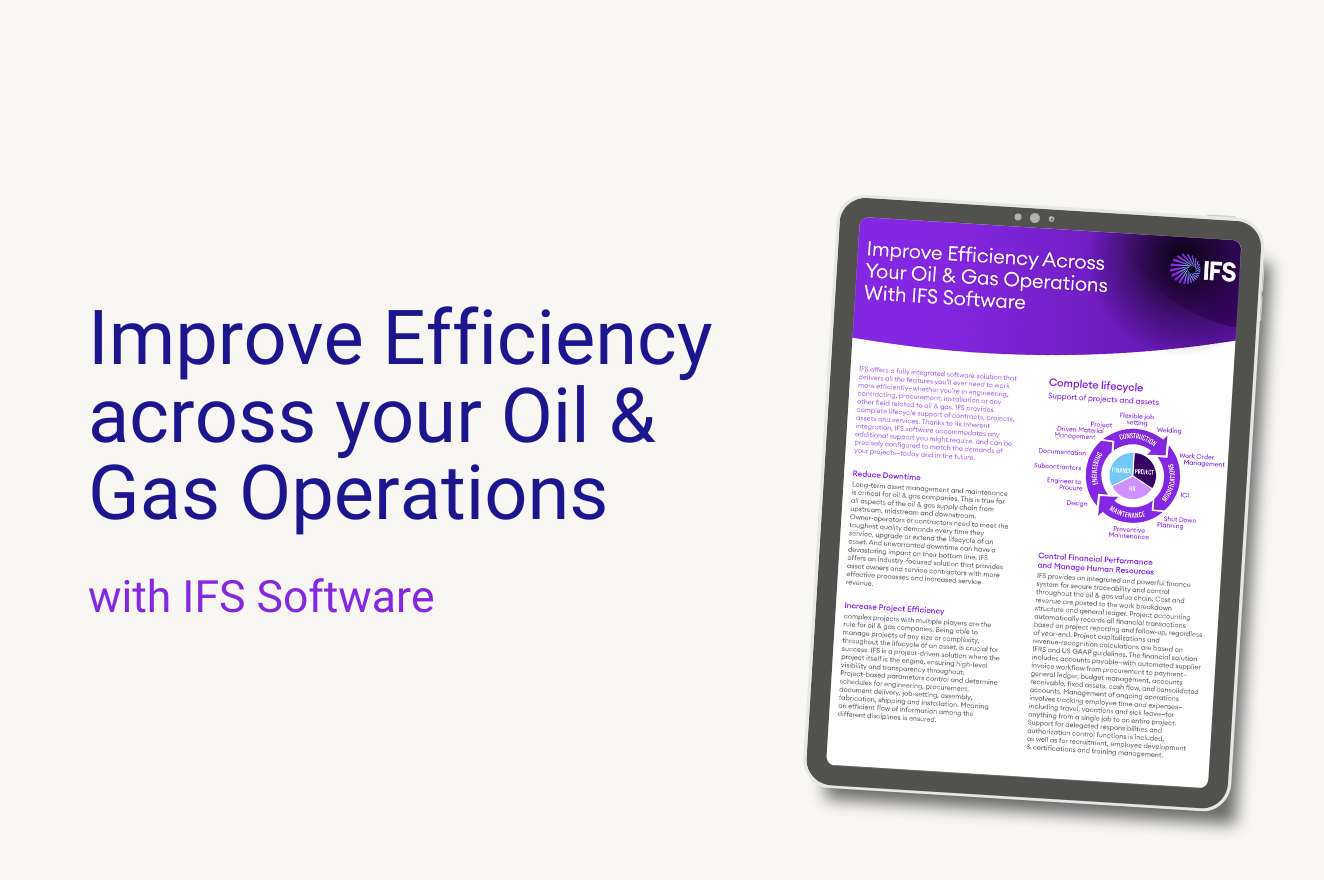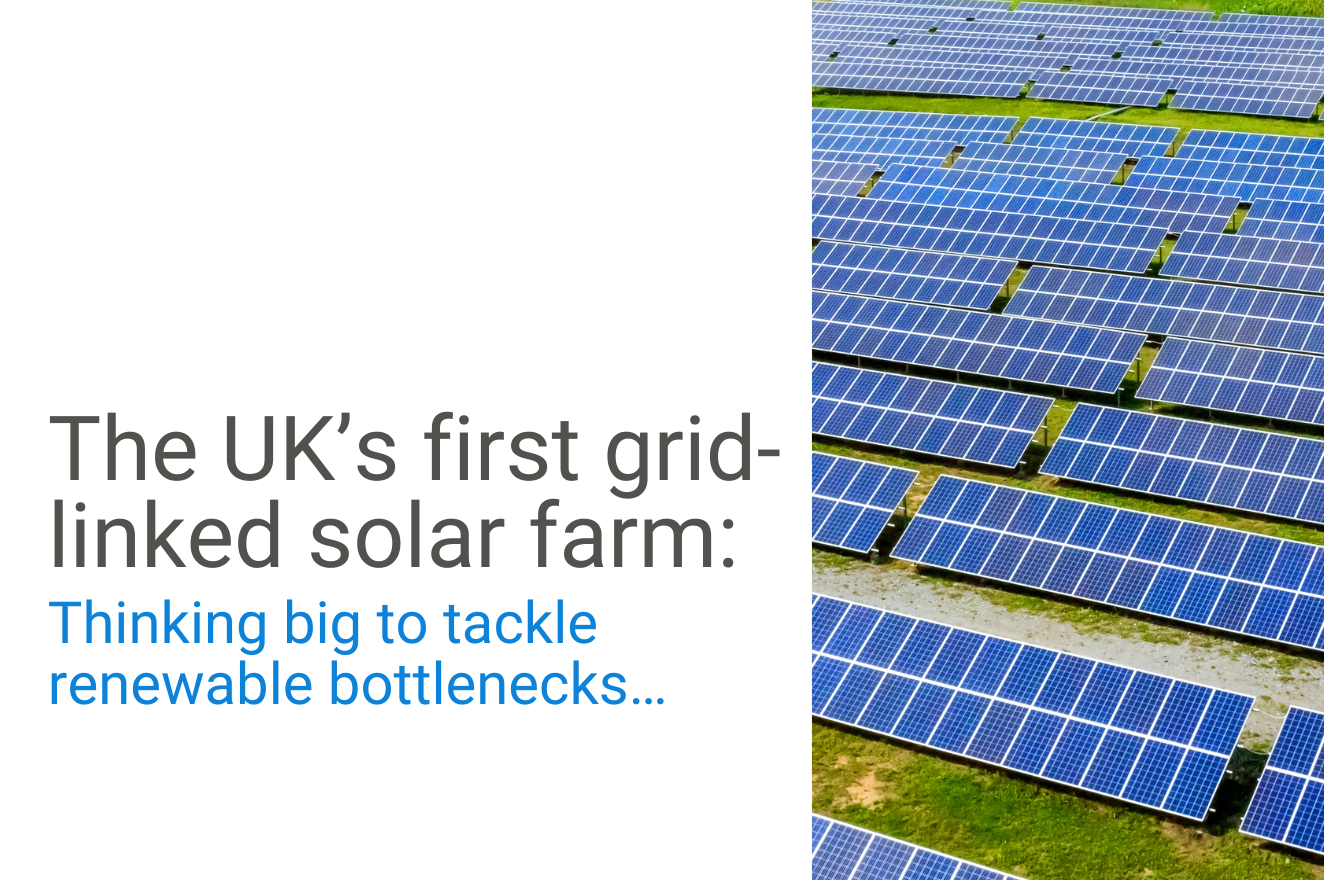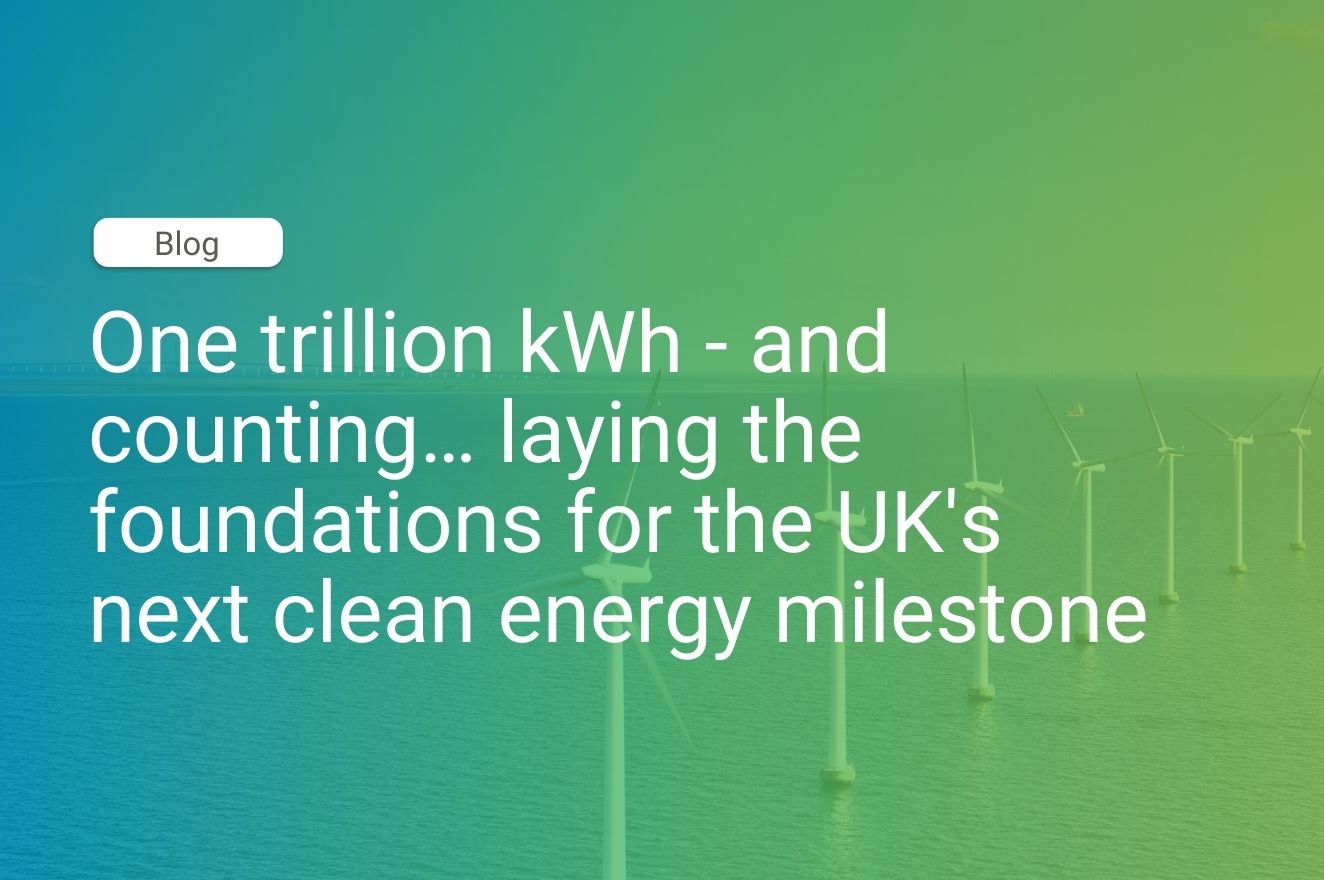December 2022
Millennium Consulting has recently partnered with global cloud enterprise software company, IFS AB. A leader in the fields of ERP (Enterprise Resource Planning), EAM (Enterprise Asset Management) and Service Management, IFS has been serving the needs of energy and utilities companies since its inception.
In Oil & Gas, Power Generation, Transmission & Distribution and Water, the need for best-of-breed cloud enterprise software has never been greater. This is a sector where sustainability requirements and rapidly shifting customer expectations are shaping the future. As a consequence, companies are increasingly having to rethink their business models, diversify their offerings and get a tighter grip on asset management. Here’s a closer look at how IFS is equipped to deliver these capabilities…
An integrated platform, delivering a holistic view
Energy companies often comprise a complex portfolio of assets scattered across multiple locations. The drive to net zero undoubtedly represents a huge strategy shift. This coincides with a host of pressing operational challenges, including the need to manage and reduce operational costs, while also ensuring the reliability and safety of existing assets.
In short, organisations within this sector have complex requirements; and those requirements are simply not going to be met by generic, one-size-fits-all planning and enterprise management solutions. Covering areas such as project management, plant maintenance, supply chain and human capital management (to name just a few), the components of IFS are hardwired to meet this sector’s specific needs. In fact, the company has been meeting the needs of this sector right from its earliest days.
Crucially from a strategic point of view, these capabilities are offered on an integrated, composable platform. Your in-the-field leaders responsible for projects, assets and service levels certainly get the benefit of best-in-breed operational management tools. But alongside this, CFOs and other board-level executives get an up-to-date, joined-up picture of performance. In terms of strategy, this puts you in a much stronger position to highlight efficiency opportunities, reduce costs and optimise processes.
The three core offerings delivered by IFS – ERP, EAM and Service Management – complement each other, enabling businesses to consolidate operations, support growth initiatives and improve customer service. This speaks directly to some of the biggest challenges currently faced by the energy sector. These are just a few illustrations of how the capabilities offered by IFS can make a difference to your organisation:
- Use IFS to adopt an end-to-end solution to support the entire lifecycle of assets, from feasibility assessments to operation and maintenance.
- Modernise field operations and get a single view of the truth across asset management, technician schedules, customer systems and outage use cases. IFS’ acquisition of Clevest in 2020 enables the company to deliver a combined enterprise asset management (EAM) and Mobile Workforce Management MWM offering: something that has helped IFS earn a place in the Gartner Market Guide for Mobile Workforce Management Software for Utilities for the eighth year in a row.
- For onboarding new assets (e.g. when diversifying your portfolio through renewables initiatives), use IFS Projects to manage the complete project lifecycle.
- What are your options for reskilling and/or redeploying existing employees to reflect changes in your operating model? Use the IFS Human Capital Management components to analyse resources and ensure alignment with organisational strategy.
While current geopolitical crises have temporarily curtailed contract-switching activity, we can, of course, expect it to return with a vengeance once supply issues have settled down.
In both utilities and power distribution, customers demand reliable and exceptional service at their fingertips. In practical terms, this involves a timely response to queries, and technicians turning up when they are supposed to. This is another key area where the integrated architecture incorporating the Internet of Things (IOT) and energy/utilities-specific capabilities of IFS prove particularly valuable. Workforce, asset management and customer service components exist on a single platform, with the ability to communicate with each other. There’s an opportunity here to ensure complete alignment of all stages of each service engagement, from customer fault logging to ultimate resolution: a huge boost in enabling enterprises to maintain and grow their reputation for quality of service.
As well as its formidable track record, it was also the ambition and transparency of IFS which led Millennium Consulting to partner with this particular vendor. This is a company that seeks to be as much a strategic partner with energy companies as a product vendor: one where the various solution components look set to continually evolve in line with the challenges faced by the sector. Recent presentations from IFS leaders explain this ambition.
We know that this sector is no stranger to innovation, whether it’s AI-driven maintenance solutions and the use of augmented reality in tandem with robotics, through to predictive analytics and machine learning to anticipate demand. To reap the full benefit of these developments, businesses need a way to utilise the data generated by such solutions into their strategic planning processes.
Rather than being based on monolithic code blocks, IFS comprises a multitude of software components linked through application programming interfaces (APIs). In other words, the architecture is flexible; enabling integration with whatever advanced operational capabilities your organisation may be seeking to implement.
An independent IDC analysis found that IFS users benefit from an average 18% productivity gain. The company is committed to ensuring maximum ROI for customers through its unique approach to Business Value Engineering. Deploying sector-specific expertise, IFS offers its customers a Digital Business Value Assessment, whereby specific opportunities, cost reductions and process improvements are identified. This is used to frame the solution scope and define implementation success.
Right across the energy and water sectors, the eyes of regulators, investors and end users are on organisations, ready to scrutinise their sustainability credentials. Companies need a robust framework for formulating ESG (environmental, social and governance) goals, and for translating those goals into action.
The IFS ESG component speaks directly to this need. Key features include the ability to track emissions right across the enterprise, an enhanced ability to factor in environmental costs in planning processes, and a capability within the Service Management module to reduce waste by facilitating the easy identification and recall of underused inventory.
Where to next?
For energy and water companies, IFS offers the opportunity to supercharge digital transformation initiatives and to significantly boost your ability to tackle some of the sector’s most significant operational and strategic challenges. To discover what’s possible, speak to Millennium Consulting today.

